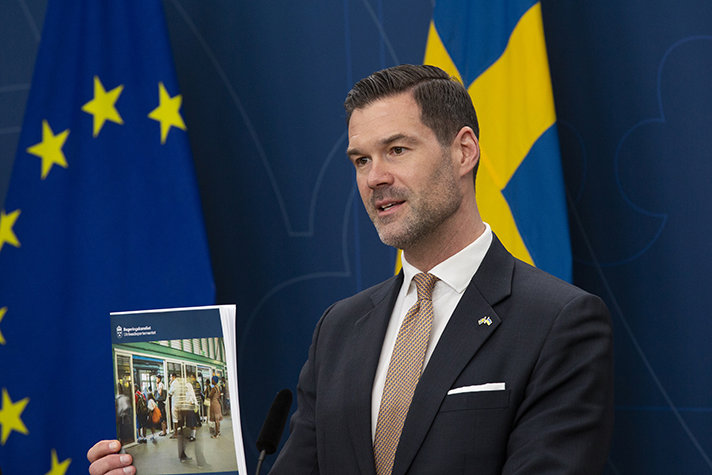Ministers on this page who have changed areas of responsibility
Ministers on this page who have changed areas of responsibility
Minister for International Development Cooperation and Foreign Trade on Government’s direction for Swedish development assistance
Published
Minister for International Development Cooperation and Foreign Trade Johan Forssell has replied to questions about the new direction for Swedish development assistance. In particular, he stressed the importance of peace and security in Ukraine and the neighbourhood, and synergies between development assistance and trade, as fundamental to Sweden’s strategic work on development assistance.

The reform agenda, ‘Development assistance for a new era – freedom, empowerment and sustainable growth’, was adopted on 14 December 2023 and outlines the direction for Swedish development assistance. Its focus is on long-term sustainability, transparency and effectiveness.
Development assistance is one of the most important foreign policy tools for pursuing and protecting Swedish interests, and contributing to reducing poverty and oppression in the world. Mr Forssell is the minister responsible for Sweden’s development assistance and cooperation efforts.
Why was it important for the Government to establish a new direction for Swedish development assistance?
“There’s a before 24 February 2022 and an after. Russia’s full-scale invasion of Ukraine brought about a paradigm shift entailing many new global challenges that require a new development assistance policy.
“In a world where needs are extensive and the funding gap is growing, it is necessary to prioritise and mobilise other financial resources. We need to do more for less and we need to work in a smarter way.”
Are there any aspects of the new direction that you consider to be particularly important?
“The Government’s strong focus on Ukraine and our neighbourhood is a key component of this development assistance policy shift. At the same time, Sweden’s engagement in the world will remain strong within the framework of the Government’s thematic priorities. The Government is also strengthening humanitarian support to save lives and alleviate suffering.
“With this new direction, development cooperation is linked with promotion and trade policy to a greater extent than previously. Swedish businesses can play a key role in the way in which Swedish development cooperation is implemented. Business Sweden’s mandate to help companies contribute to the objectives of development assistance, and to green and digital transition in low- and middle-income countries, is being expanded.
“Another important part of the new direction is that the synergies between development assistance and migration policy will be enhanced so as to meet global challenges related to irregular migration and forced displacement, returns and repatriation.
“I also want to emphasise the importance of results, quality, transparency and effectiveness, and that it should be possible to report the results of development assistance against clear and measurable objectives in the framework of the Government’s priorities. Development assistance policy should also be transparent so that Swedish taxpayers know how their resources are being used. Citizens have the right to transparency and should be able to be assured that the tax revenues used for development assistance are making a difference.
“The new strategy also includes enhanced promotion of the image of Sweden, with the aim of improving the visibility and communications impact of our country’s development assistance activities.”
How would you describe Sweden’s role as a development actor and partner in the world?
“Swedish development assistance is generous and predictable, but not infinite. The financial frameworks apply to a development assistance budget of SEK 56 billion per year in 2023–2026, decoupled from gross domestic product.
“Swedish development cooperation is implemented in partnership with various actors such as governments, EU institutions, UN agencies, international financial institutions and civil society organisations. Sweden must shoulder the responsibility that comes with being a major donor and ensure influence and political impact commensurate with our financial contributions.”
What role does Swedish development assistance play in democratic development?
“Development cooperation plays an important role in efforts to counter the democratic backsliding in many parts of the world. Sweden must be a strong voice and actor for democracy, human rights and freedoms and the rule of law so as to increase people’s freedom and combat oppression.
“Development cooperation is one of the most important foreign policy tools for pursuing and protecting Swedish interests and tackling the challenges that Sweden and the world are facing. Swedish development assistance should not support states or actors that are non-democratic or obstruct the rules-based world order and thus undermine Swedish interests.”
What is the next step in the work related to the new reform agenda for development assistance?
“The reform agenda outlines the new direction for Sweden’s development assistance and will have an impact throughout the country’s development cooperation, at all levels. It also provides a starting point for several new processes to simplify, clarify and streamline the management and follow-up of the assistance as a whole, and to improve the results achieved.
“The Government intends to move from bilateral development assistance strategies to country strategies in order to strengthen the impact and improve the prospects of the Government’s priorities.
“Improved and clearer management also enhances the prospects of long-term sustainability and closer integration of various political areas, such as foreign policy, security policy, climate policy, migration policy, trade policy and development assistance policy.
“We will also review the feasibility and appropriateness of establishing a pilot programme for export financing supported by development assistance. Its aim would be to provide long-term sustainable solutions in countries eligible for official development assistance according to the OECD DAC guidelines.”

 X
X